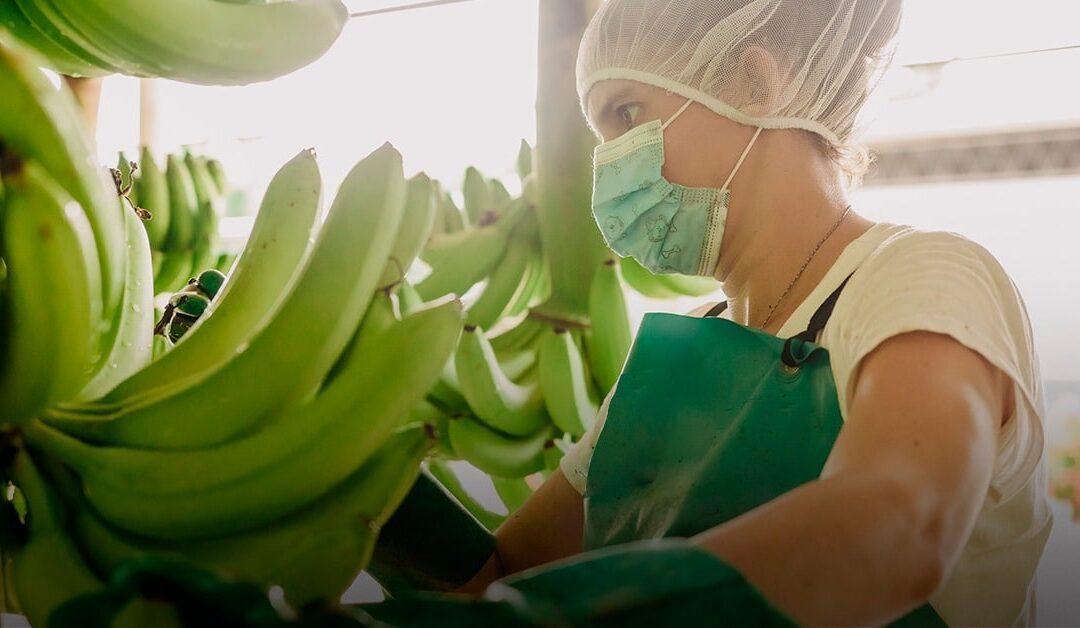Today, we will plunge into the fascinating world of bananas, also known in some places as plantains, to discover the differences and benefits between conventional bananas and organic bananas. These two types of bananas have their own unique characteristics, leading us to wonder which of them is the more suitable option for our tastes and preferences. Through this blog, we will explore the benefits of each type, highlighting the practices implemented at AgroAmerica.
International Regulations and Standards
Both conventional and organic bananas are subject to strict regulations in the countries where they are grown and marketed. These standards are set by government authorities and global certifications to ensure food safety, product quality, environmental protection, and fair wages for workers. At AgroAmerica, we are proud to implement more than 10 certifications, some specific to conventional bananas and others to organic bananas, which focus on quality, safety, and sustainability. Our company’s organic banana cultivation adheres to the rigorous standards of the U.S. Organic Food Agriculture Program and the European program.
Availability and Cost
Conventional farming methods are more efficient, resulting in greater market supply, lower cost, and greater availability to meet the growing global demand for bananas. As a result, conventional bananas are widely available in supermarkets and local markets throughout the year and are the largest selling product by volume within the banana category. Their high production and cultivation methods make them more affordable for most people, making them an economical and accessible option. Compared to other fruits such as apples and grapes, conventional bananas in the United States and Europe are cheaper per pound.
Durability
Conventional bananas tend to have a longer shelf life before they fully ripen or show signs of spoilage. This is especially beneficial for those who wish to buy larger quantities and consume them over several days without worrying about waste.
Authentic Flavor and Aroma
Proponents of organic bananas argue that they have a more authentic taste and aroma. This can provide a more satisfying and complete taste experience for those who value the deliciousness of this delectable fruit.
100% organic labeling
In order for a product to be labeled as “100% organic”, it must undergo a rigorous inspection by a USDA-approved certifying agency. This inspection aims to verify that the growing location complies with all the rules and regulations set forth in the USDA organic standards. Only after verifying that the producer conforms to these guidelines will the product obtain the coveted organic certification, thus guaranteeing its quality and authenticity.
Nutritional Values
Both conventional and organic bananas share many similar nutritional properties, as they are essentially the same fruit. Both are rich in vitamin C, vitamin B6, vitamin B9 (folic acid), potassium, magnesium, dietary fiber, and natural sugars such as fructose, glucose, and sucrose. Both options are safe and nutritious, making them an excellent choice for a healthy and balanced diet.
Environmental Sustainability
At AgroAmerica, we are committed to sustainability in the cultivation of both types of bananas. Our agricultural practices comply with international certification standards, which contributes to the preservation of biodiversity, soil, water, and environmental protection.
Labor Welfare
In both our organic and conventional banana plantations, we prioritize the well-being of our workers and the implementation of fair and ethical labor practices.
Use of Chemicals
It is important to mention that both crops use chemicals. The difference is that the organic method uses purer chemicals, based on natural and organic inputs such as potassium and phosphorus to nourish and protect the plants. In the case of nitrogen, an essential nutrient for plant growth, it is used in both crops. In organic farming, nitrogen can be obtained from natural sources such as animal waste and conventional bananas use nitrogen as urea.
Conclusion
Ultimately, the choice between conventional and organic bananas depends on personal preference and economic considerations. Both types offer positive qualities that appeal to different types of consumers. At AgroAmerica, we pride ourselves on growing both types of bananas with sustainable, environmentally, and worker-friendly practices, always focused on providing high quality, exceptional tasting products for everyone to enjoy, so the next time you choose a banana, enjoy it knowing that you are selecting a delicious and nutritious option regardless of your preference!
